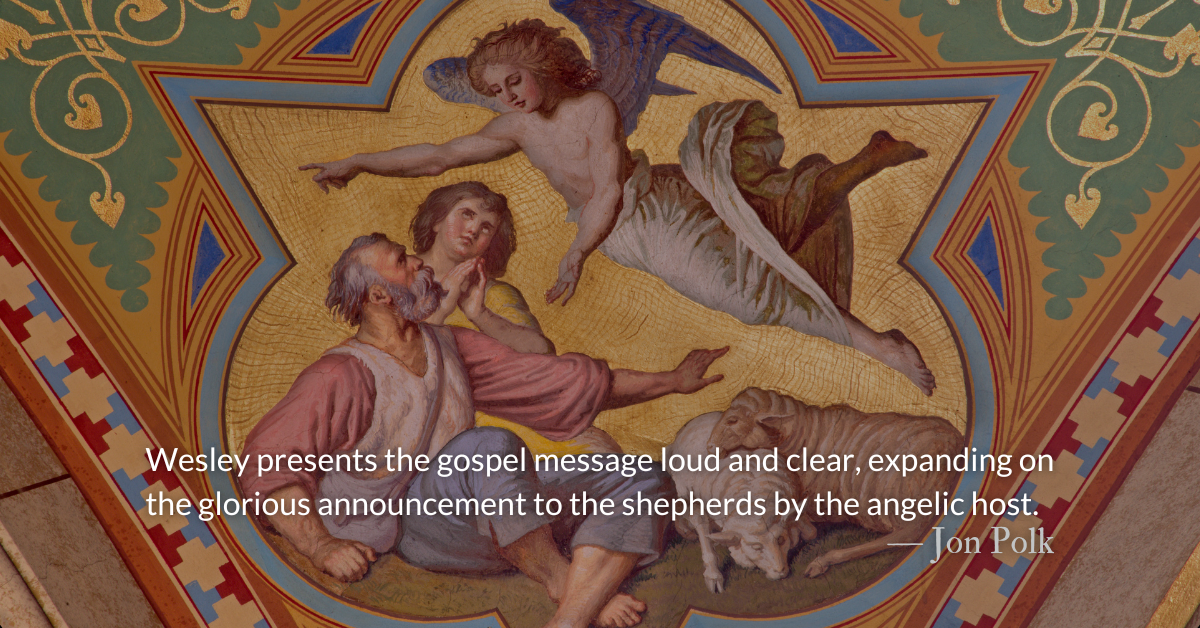Scripture Focus: Psalm 130:7-8
7 Israel, put your hope in the Lord,
for with the Lord is unfailing love
and with him is full redemption.
8 He himself will redeem Israel
from all their sins.
Luke 2:13-14
13 Suddenly a great company of the heavenly host appeared with the angel, praising God and saying, 14 “Glory to God in the highest heaven, and on earth peace to those on whom his favor rests.”
Reflection: Hark! The Herald Angels Sing — Carols of Advent Joy
By Jon Polk
One has to wonder whether the iconic Christmas carol, Hark! The Herald Angels Sing, would be as popular today if it still retained its original opening line, “Hark how all the Welkin rings, Glory to the King of Kings.”
If you don’t know – and you probably don’t – welkin is an archaic English word that means the sky or the heavens, the highest celestial realm inhabited by God and angels.
Already a theologically dense hymn, its usage would have likely been hindered by the inclusion of an unfamiliar and arcane term in the first line. Thankfully, what we have instead has now become comfortably familiar.
Hark! the herald angels sing,
“Glory to the new-born King;
Peace on earth, and mercy mild;
God and sinners reconciled.”
Written by Charles Wesley in 1739, less than a year after his evangelical conversion, the song bears the marks of this eager new convert wanting to clearly express the fullness of his faith.
Hail the heaven-born Prince of Peace!
Hail the Sun of righteousness!
Light and life to all He brings,
Risen with healing in His wings!
As students, Charles Wesley, his brother John, and friend George Whitefield were members of the infamous “Holy Club” at the University of Oxford in the 1730s. All three were founders and leaders of the early Methodist movement. It should come as no surprise that Wesley’s Christmas hymn is rich with theological proclamations.
Veiled in flesh the Godhead see,
Hail the incarnate Deity!
Pleased as man with man to dwell,
Jesus our Immanuel.
Scriptural references abound in the hymn, in particular, names or titles referring to Christ: Immanuel, Prince of Peace, Sun of Righteousness, Desire of Nations, Second Adam. Wesley presents the gospel message loud and clear, expanding on the glorious announcement to the shepherds by the angelic host.
Mild He lays His glory by,
Born that man no more may die;
Born to raise the sons of earth;
Born to give them second birth.
But what happened to the Welkin?
Wesley’s brother John published the carol, originally titled Hymn for Christmas-Day, in his 1739 collection, Hymns and Sacred Poems. Wesley also shared the song with George Whitefield who many years later included it in his 1754 compilation, Collections of Hymns for Social Worship.
Whitefield made a number of lyrical changes to the song before publication. Fortunately, one of the most notable modifications was to remove the reference to “Hark how all the Welkin rings” in favor of the more accessible phrase, “Hark, the Herald Angels sing.”
Whether it is from the Welkin or the Herald Angels, the good news of Jesus’ birth rings out with joy for all people.
With angelic hosts proclaim,
“Christ is born in Bethlehem.”
Listen: Hark! The Herald Angels Sing by Norman Hutchins
Read: Lyrics from Hymnary.org
Divine Hours Prayer: The Greeting
Your love, O Lord, reaches to the heavens, and your faithfulness to the clouds. — Psalm 36.5
– From The Divine Hours: Prayers for Summertime by Phyllis Tickle.
Today’s Readings
2 Chronicles 24 (Listen 5:07)
Psalms 129-131 (Listen 1:45)
Read more about Pause To Read
The 1st full episode of our new podcast, Pause to Read, is out tomorrow morning. Please subscribe, share the episodes, and give a rating/review to help others find the show.
Read more about Supporting Our Work
It is donors just like you who fund our ad-free content that brings biblical devotionals to inboxes across the world.







